Sxépxel
To the North of Aldenard lies a cluster of islands inhabited primarily by Indigenous Viera, Miqo'te, Hrothgar and Roegadyn. Though not untouched by the rest of Hydaelyn, the Islands still remain a rich and beautiful haven full of culture, the land kept beautiful and healthy by its dedicated inhabitants.
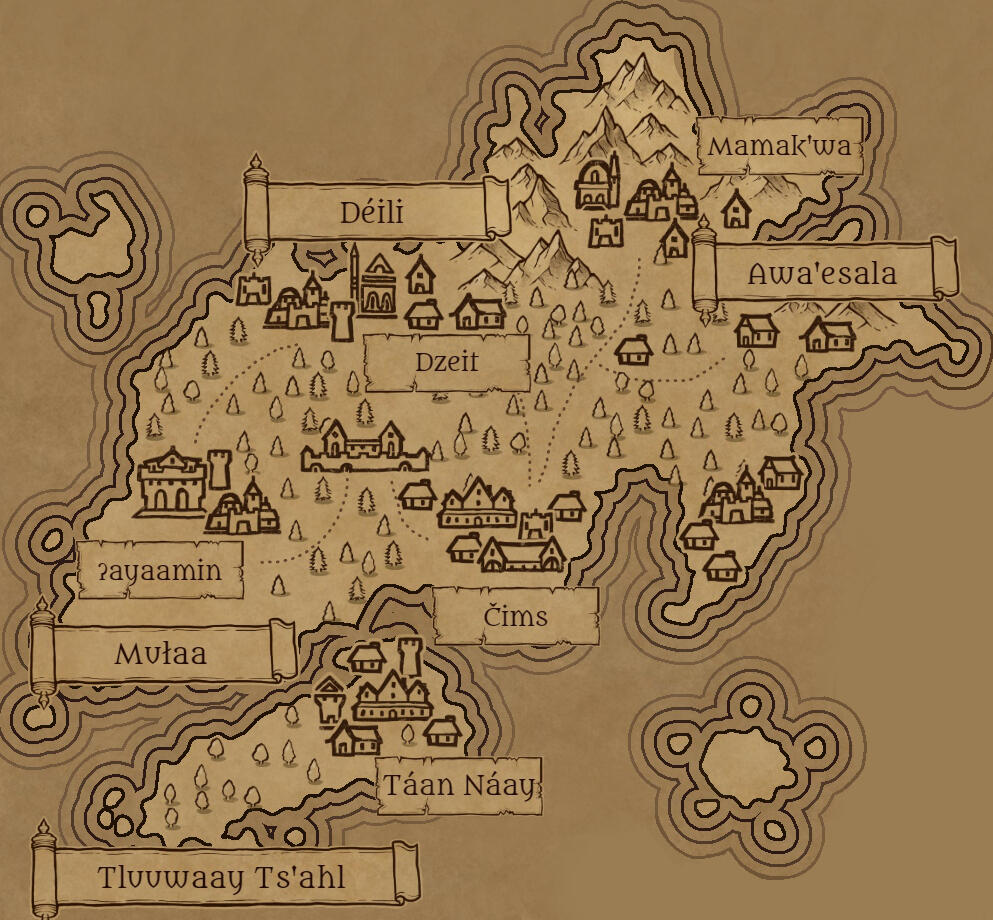
The islands of Sxépxel hold four different Indigenous tribes, all with different languages. Though they do share similarities, they all have their own cultures and traditions. Each tribe has very loose borders, and the peoples come and go as they please with little conflict. Though each tribe has their own rules about their lands, Mułaa is the center of trade and culture on the island. On top of Mułaa's biggest settlement, Čims, there is another large settlement to the west, ʔayaamin. ʔayaamin is the meeting place of all the tribes, and once per year all of the tribes come together to have a potlach. There, they share and trade culture, dance, eat, and discuss their agreements and grievances with the tribe's leaders.
All five tribes are made up mainly of Indigenous Roegadyn, Viera, Miqo'te and Hrothgar, though there are people of many species that are native to the island of Sxépxel, including a large population of Hyur. The peoples of Sxépxel don't discriminate. They are a diverse people, rich with culture and tradition, and as long as you respect the land and all she gives you, then you are welcome.
tribes
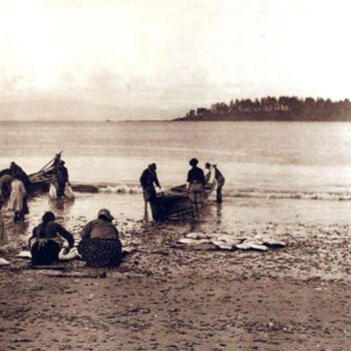
Mułaa
(mooh-la)
Mułaa is the center of trade on the island, and being the largest of the five tribes, holds the most jurisdiction. When an issue pertains to the good of the whole island and her peoples, it falls to the leaders of Mułaa to be the mediator between all five tribes.
The most major settlement, Čims (chims), is the settlement with the highest population, and is the settlement where the leader resides, as well as where yearly potlaches, events, and ceremonies take place when they pertain to the whole of the nation. It's a frequent meeting place.
Mułaa is a place of art, and a place of wealth and beauty. Its culture focuses heavily on tradition, ceremony and art. Primarily, Mułaa artists are carvers and weavers, making use of the dense forest that covers most of the land.
Tluuwaay Ts'ahl
(hlooway ch-AWL)
Ts'ahl is the small island just below Mułaa. In the past, the smaller tribe had tense relations with Mułaa. Recently, however, the two have made a truce and Ts'ahl decided to join the tribes of Sx̱épxel. The agreement included arranged marriages between the two tribes' leaders' families.
Alike to vikings, Ts'ahl is a mainly Man populated island of seafaring folk, canoe makers and sailors by trade. The most talented at their craft by far, the Island of Sx̱épxel relies on them to make their sea travel easy and safe. The peoples of Ts'ahl's culture is deeply rooted in their tradition of battle and plundering, traveling to nearby smaller islands and even to the mainland to bring back riches and art from far and wide.
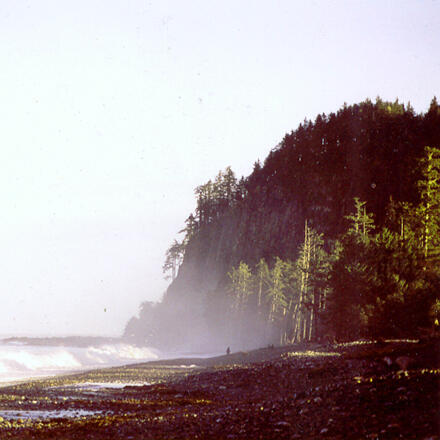
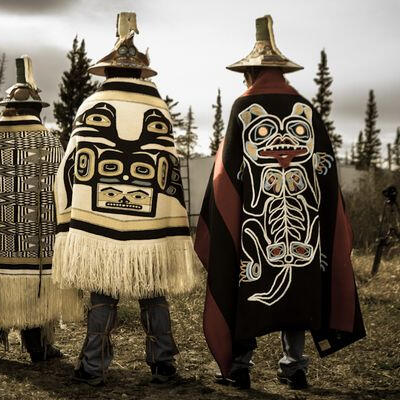
Déili
(deh-ee-lee)
Primarily made up of fishing settlements, Déili has the highest export of fish in the entire nation. The tribe is also the one most dense with Miqo'te out of all those on the Island.
Déili is heavily rooted in tradition, but one of the only tribes in Sx̱épxel that isn't heavily rooted in the arts. To a native of Déili, the most important talent you can have is a talent to work, and to do your part to contribute.
Awa'esala
(awa-ayy-salah)
Awa'esala is the second largest area of Sx̱épxel, but with the smallest population out of all the other tribes. Due to the mountainous regions of the area, it's hard for the coastal reliant tribes to find a place to settle.
Residing mainly around the bases of the mountains or near the shores of the sea, Awa'esala has the most diverse population out of the entire island. With so many visitors from Ilsabard due to being the most easily within reach of the mainland, Awa'esala's culture, architecture and peoples are far different than that of the rest of the island.
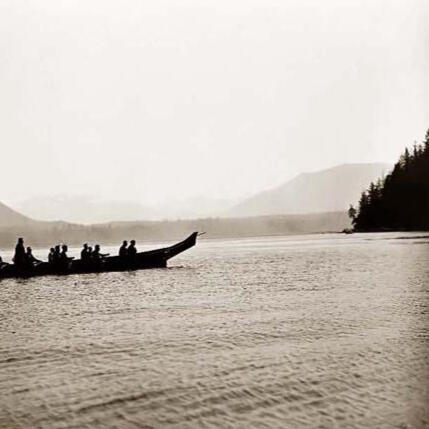
Traditions
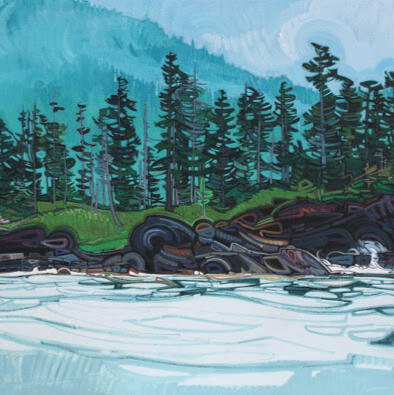
potlach
(pawt-latch)
Not just anyone can host a potlatch. They are one of the most important events in Sxépxel's culture. A potlatch can be held for many reasons; naming, business negotiations, transactions, marriages, divorces, deaths, end of mourning, transfer of property, adoptions, initiations, treaty proceedings, monument commemorations, or simply to honour the ancestors. They are also very important for the people of Sxépxel to not only reaffirm the connection of their family, clan, or international connections; but also their connection to the supernatural world.
Typically, during a potlatch, there will be much music, dancing, singing, and storytelling. All around, it's a fairly happy occasion. Many times food is served and shared, and gifts are given; whether it be a crafted ware or intellectual property, such as a story or a song.
birth elements
When a new child is born, it's always a celebration. The child is introduced to all of the people of their village and clan, and sometimes relatives will travel to meet the newborn. As soon as possible, a Potlatch is held for the entire village by the Chieftain, where relatives and villagers will sing and dance in celebration of the new addition.
Either a seer that lives in the village or a seer from a neighboring village will come to meet the child. This is where the baby gets their childhood name based on what the seer sees of the child's future. They will have celebrations to receive their adult name, and their elder name as well. At the same time, the seer will bless the child, as well as give the child a birth element. This is the element (Fire, Water, Earth, Air) that the seer finds the child to have the most affinity with, and will determine what kind of element they will be able to harness best; though not all children will be able to harness them very well.
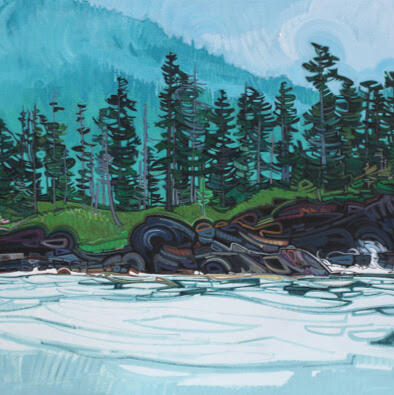
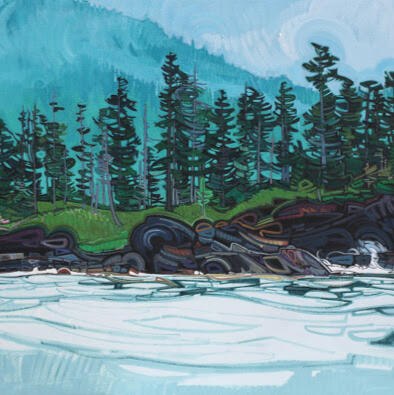
the ancestors
It's believed that people who have magic-related powers are blessed by the gods and their ancestors to be magic-wielders to not only protect their people and land, but also to care for their land. Many people of Sxépxel who have any aether affinity in the slightest tend to be very skilled in a magic that is only used by the people of Sxépxel, which is a general harnessing of nature and the elements; what one might refer to as a 'Shaman' or a 'Druid'. It's actually very typical that people with aether affinity become farmers or fisherman rather than fighting or warring, as the type of magic they know is best suited for such.
The people of Sxépxel's ancestors are always with them and bless them if they remember them and tell their stories, on a sort of supernatural plain of being. This strong connection to the spirits brings them power and fortune, and by praying to certain spirits, they can gain certain fortune. It's fairly often that one person will have a favourite spirit, and therefore have affinities for certain things.
credit
Thanks for checking out my project! My name is Eir and I'm an Indigenous freelance digital artist who likes video games. I began working on this concept because I'm a huge fan FFXIV, but wasn't satisfied with the Indigenous representation in the game. I hope you enjoyed it! Feel free to contact me about any questions.
Sx̱épxel is specifically based off of Northwest Coast Indigenous people. I myself am not Northwest Coast Indigenous, I am plains Indigenous. But I'm incredibly interested in the culture of Northwest Coast Indigenous people, as I moved to the area a few years ago. While I've used a lot of the language and culture of certain Northwest Coast tribes as springboards, not everything is exactly the same, as this is supposed to be a fantasy setting. If you are Northwest Coast Indigenous, and you have any concerns about my ideas, please let me know! I would love to hear what you think.
Square Enix - FFXIV
Map Made With: - Inkarnate
Tribes Studied: - Nuu-Chah-Nulth, Haida, Tlingit, Kwakwakaʼwakw, Tsimshian
Background Image - Sandra Harris
Tribes Page Images: